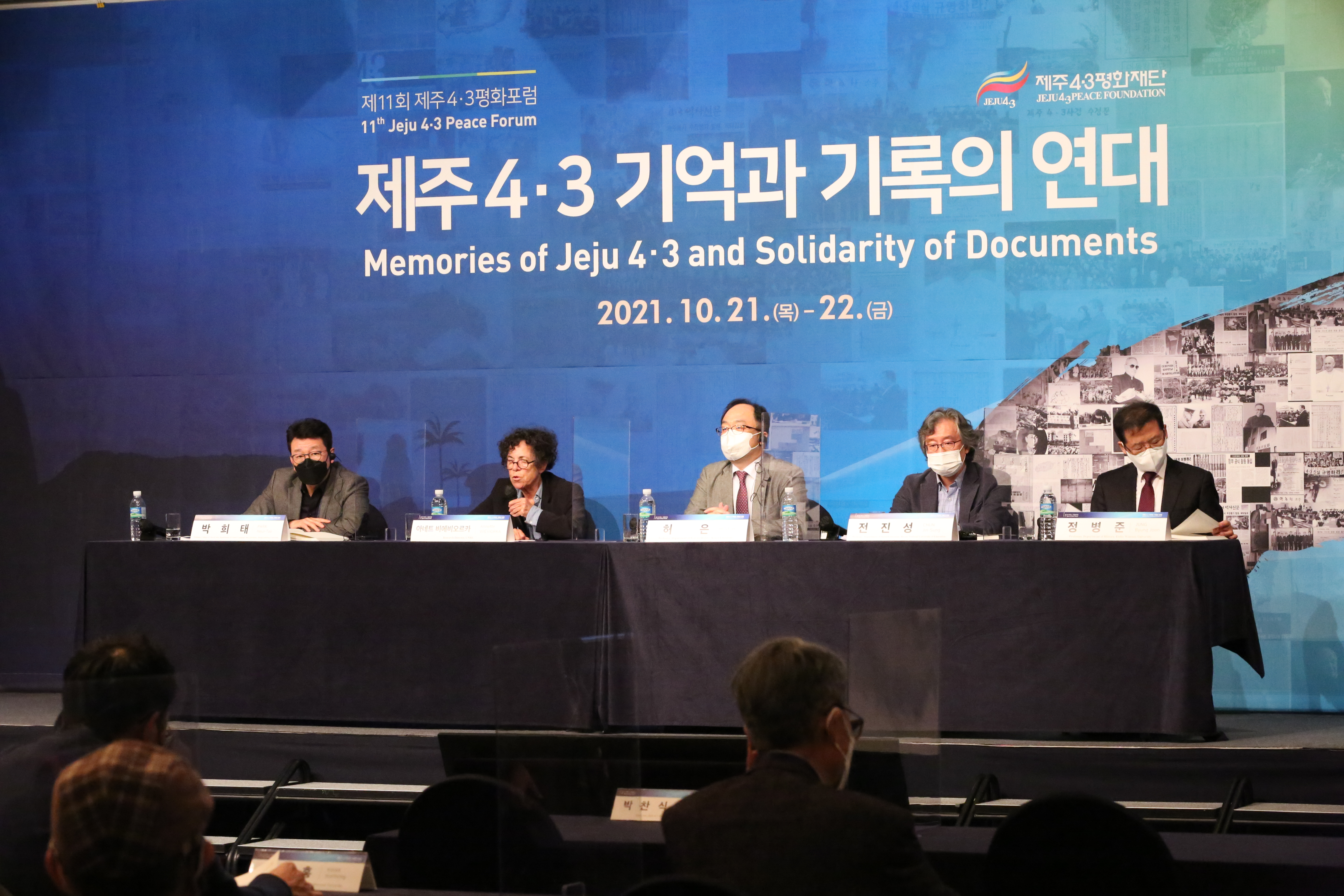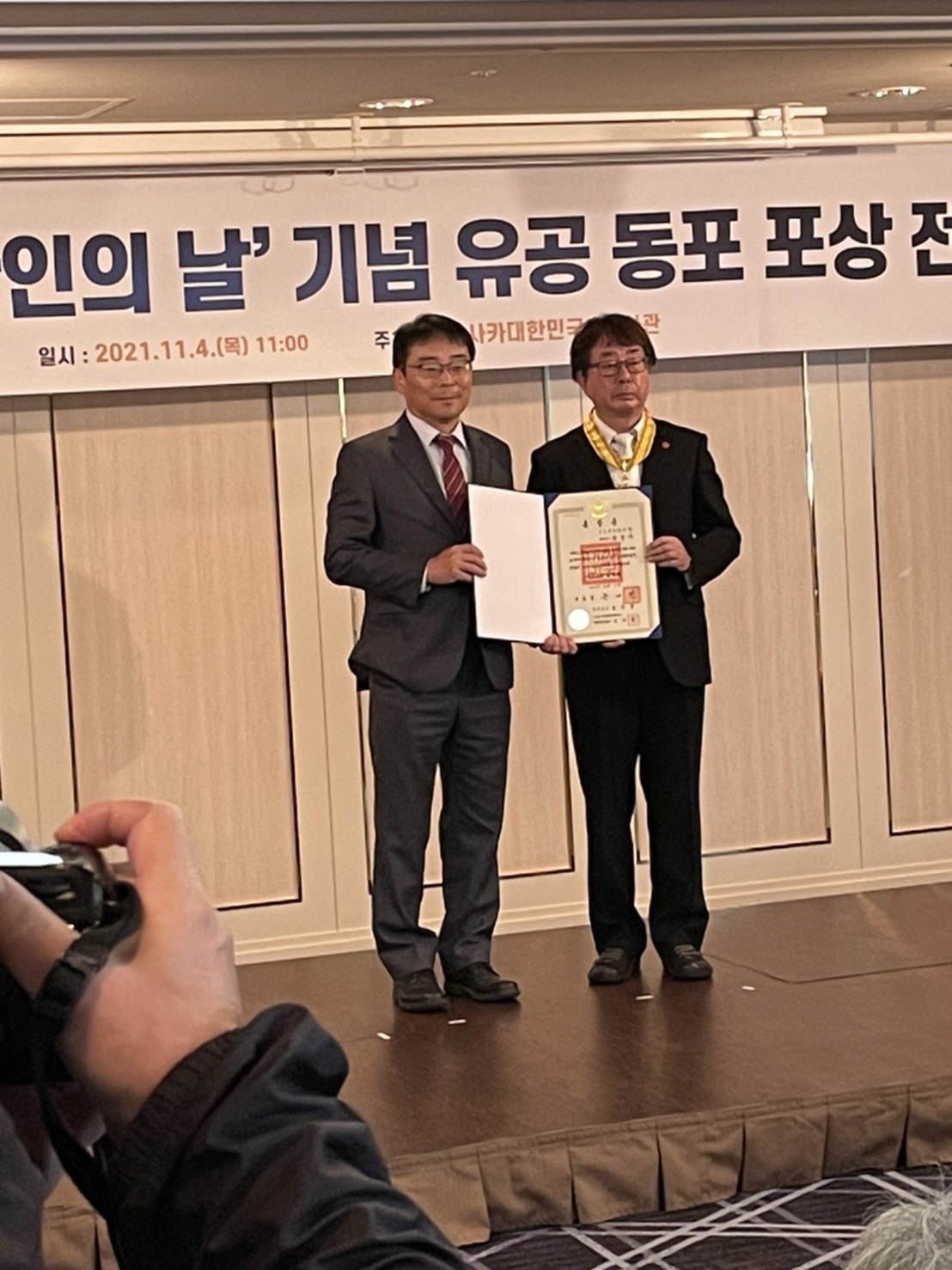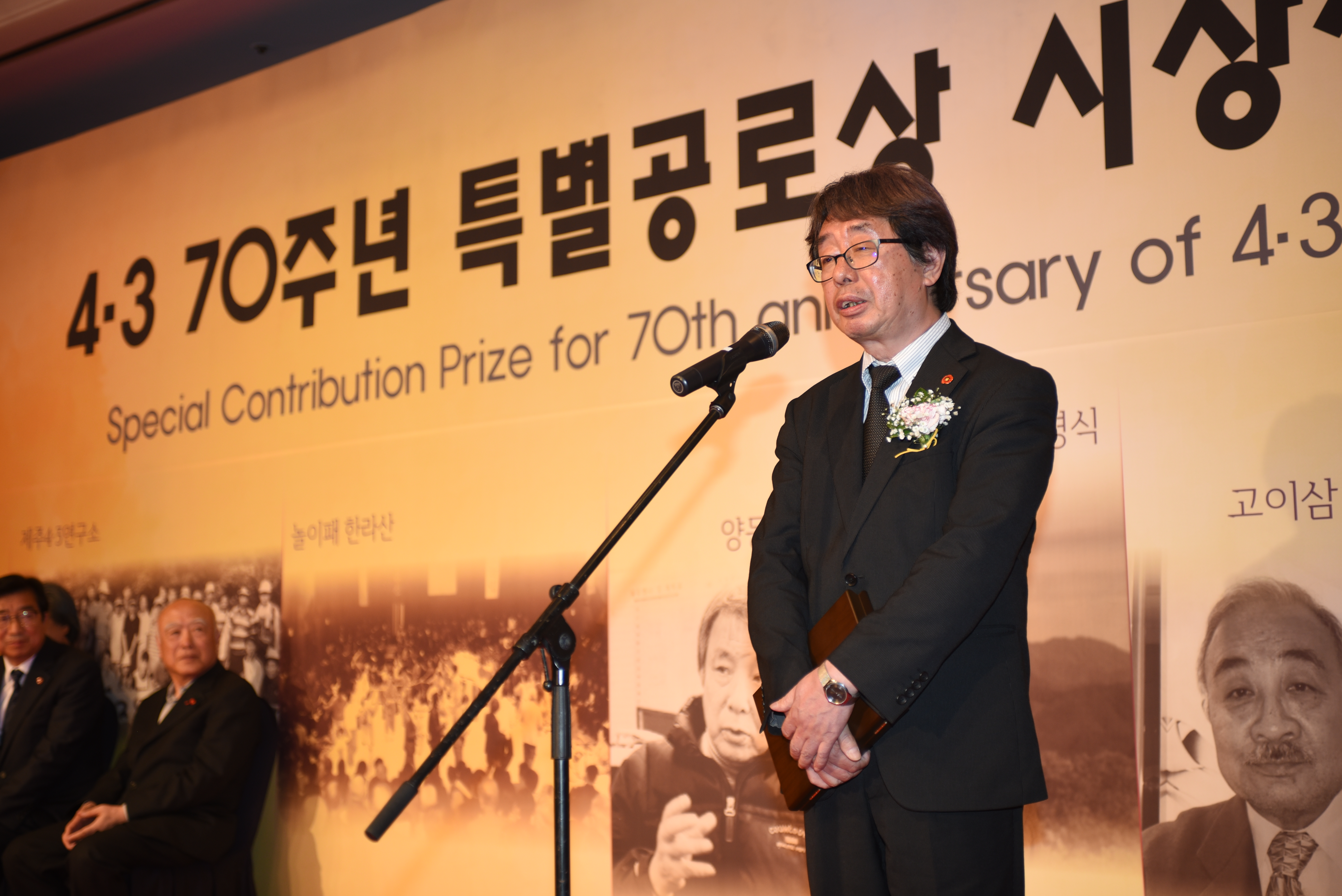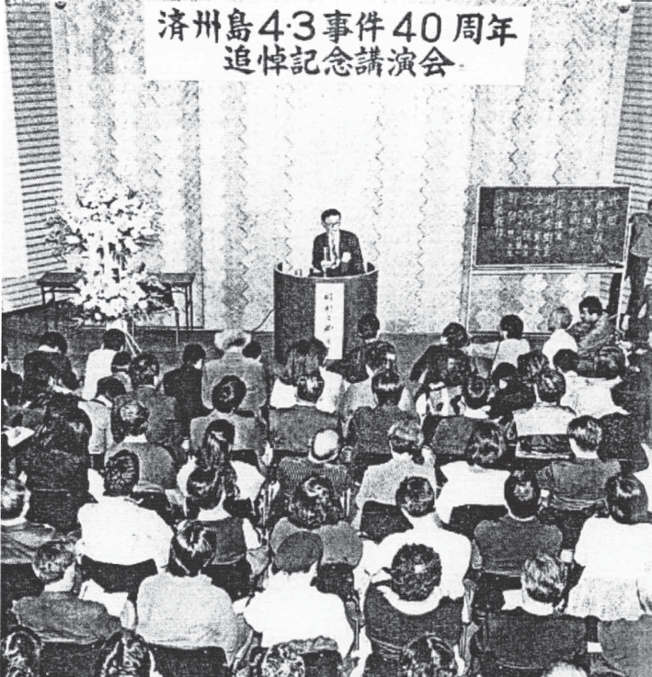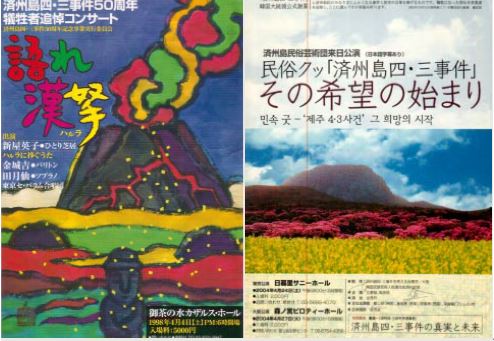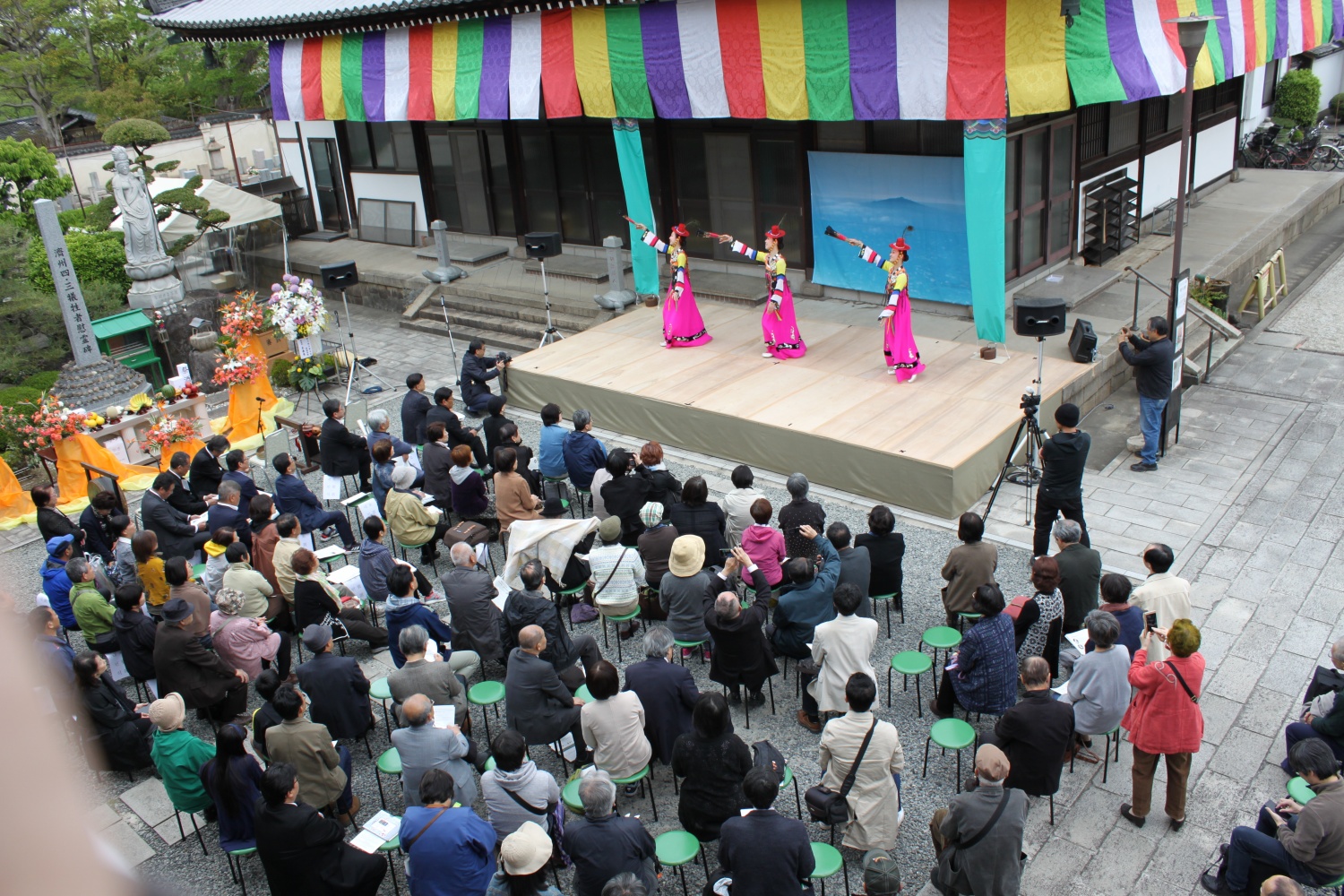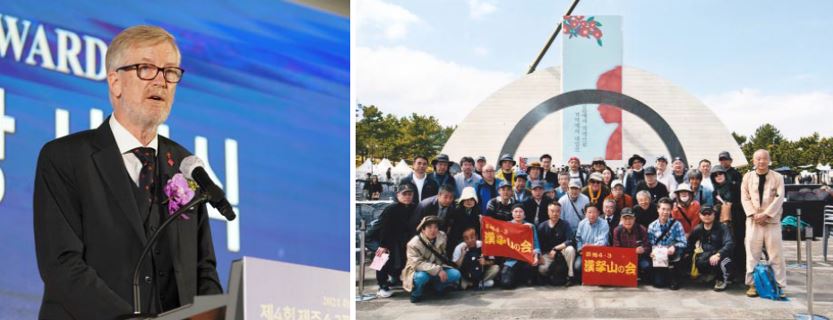
The Jeju 4·3 Peace Foundation recognizes Dan Smith (left) and the Jeju 4·3 Hallasan Mountain Society with a Peace Prize and a Special Prize (respectively) at the fourth Jeju 4·3 Peace Prize Ceremony.
Dan Smith and Jeju 4·3 Hallasan Mountain Society recognized with Jeju 4·3-related prizes
Dan Smith, director of the Stockholm International Peace Research Institute (SIPRI), and the Jeju 4·3 Hallasan Mountain Society, a Japanese civic group, were awarded the Jeju 4·3 Peace Prize and the Jeju 4·3 Special Prize, respectively.
The Jeju 4·3 Peace Foundation and the Jeju 4·3 Peace Prize Award Committee (chairman: Catholic Bishop Kang U-il) held the fourth Jeju 4·3 Peace Prize Ceremony on Nov. 30 at Maeson Glad Jeju Hotel in Jeju City.
The awards ceremony was attended by Koo Man-seop, acting governor of the Jeju province, Jwa Nam-soo, chairman of the Jeju provincial council, Lee Seok-moon, Jeju provincial superintendent of education, Oh Im-jong, chairman of the association of Jeju 4·3 victims’ families, Moon Dae-lim, chairman of Jeju Free International City Development Center, and Jang Jung-un and Lee Munkyo, former chairmen of the Jeju 4·3 Peace Foundation. The attendees also included Kang Kum-sil, former South Korean Minister of Justice and current jury member of the Jeju 4·3 Peace Prize, Koh Choong-suk, former president of Jeju National University, Chong Ku-do, chairman of the No Gun Ri International Peace Foundation, and Chu Chin-oh, former director of the National Museum of Korean Contemporary History.
The event began with opening remarks by Yang, director of the Jeju 4·3 Peace Foundation, followed by updates on developments in the scope of the prize, a report on the awardees’ accomplishments, welcoming remarks by Kang, chairman of the Jeju 4·3 Peace Prize Award Committee, presentation of the Jeju 4·3 Peace Prize, congratulatory remarks by the heads of government and public authorities, and congratulatory performances.
Yang Jo Hoon explained during his opening speech that the prize was formerly presented to those who contributed to the study or popularization of Jeju 4·3, while the winners of the fourth annual event broadened the spectrum of candidates to recognize researchers and experts in world peace. “I expect the expanded boundaries of the prize to help globally publicize the values learned from Jeju 4·3 and the model of resolving Jeju 4·3 that we have pursued,” he stated.
During his welcoming speech, Bishop Kang U-il reminded the participants of the objective of the prize, saying, “the residents of Jeju Island who experienced Jeju 4·3, a historical tragedy, established the peace prize with high hopes for the prevention of recurrence of hatred, confrontation, and violence on Earth, and for the realization of lasting peace.” The Catholic Bishop also prayed that the contribution and efforts made by the awardees would continue to bear fruit in the future.
Dan Smith, winner of the fourth Jeju 4·3 Peace Prize, is the current SIPRI director and has designed and practiced programs that aim to analyze peace and the environment, make relevant policies, and promote peace and reconciliation in different forms.
During his acceptance speech, Smith said, “I really can hardly express how honored I am today and how grateful to be receiving this prize.” The SIPRI director recalled the moment when he was informed of the honor, citing the letter from the Jeju 4·3 Peace Prize Award Committee that noted him as “an activist, a scholar, a leader of a world-renowned institute, and someone working for peace on the Korean Peninsula.” After expressing his gratitude, Smith began his speech by saying, “The people of Jeju showed great steadfastness in a long campaign to have the truth of the massacre in 1948 to 1949, and the years after, uncovered and acknowledged.” He also emphasized the importance of the truth by commenting that “Whatever the pressure of the time, whatever the situation in Korea and in world politics, whatever the fears and insecurities — what happened was not acceptable.”
Smith mentioned several meetings convened by SIPRI which have concerned the Korean Peninsula. “As opportunity arises when the COVID pandemic is over, we will do so again.” He continued, “We know they made a modest contribution to inter-Korean détente in 2018, and we hope there can be a similar contribution in the coming period.” Before concluding his speech, the peace activist also shared his bigger vision of peace at a global level, willing to actively address challenges in state security and human security.
The Jeju 4·3 Hallasan Mountain Society, the winner of the fourth Jeju 4·3 Special Prize was founded in 2008. Over the past 13 years, the Japanese civil society group has engaged in different activities every year, including attending the Memorial Ceremony for the Jeju 4·3 Victims, taking tours of historical sites related to Jeju 4·3, and hosting a memorial service in Okinawa to pay tribute to the victims of the Battle of Okinawa.
During the awards ceremony, the society was represented by Akiko Nagata, a board member who gave the acceptance speech on behalf of the society’s president, Yutaka Umisedo, and advisor, Isamu Nagata.
Nagata expressed her gratitude, saying that it is a great honor that their society is the first group to be awarded the prize and accepting the prize inspires a strengthened sense of responsibility. The Japanese civil activist also said, “We are committed to the continued and expanded memorial ceremony for the Jeju 4·3 victims that connect Tsushima and Jeju Islands.” Pledging to the practice of “acting for Jeju 4·3 in Japan,” she said her society will pursue solidarity between people, going beyond national borders.
The Jeju 4·3 Peace Foundation presented the prize money to the awardees, worth 50,000 USD for the Jeju 4·3 Peace Prize and 10,000 USD for the Jeju 4·3 Special Prize. For those who were unable to attend the ceremony due to COVID-19 quarantine guidelines, the event was broadcast live on the foundation’s YouTube channel.
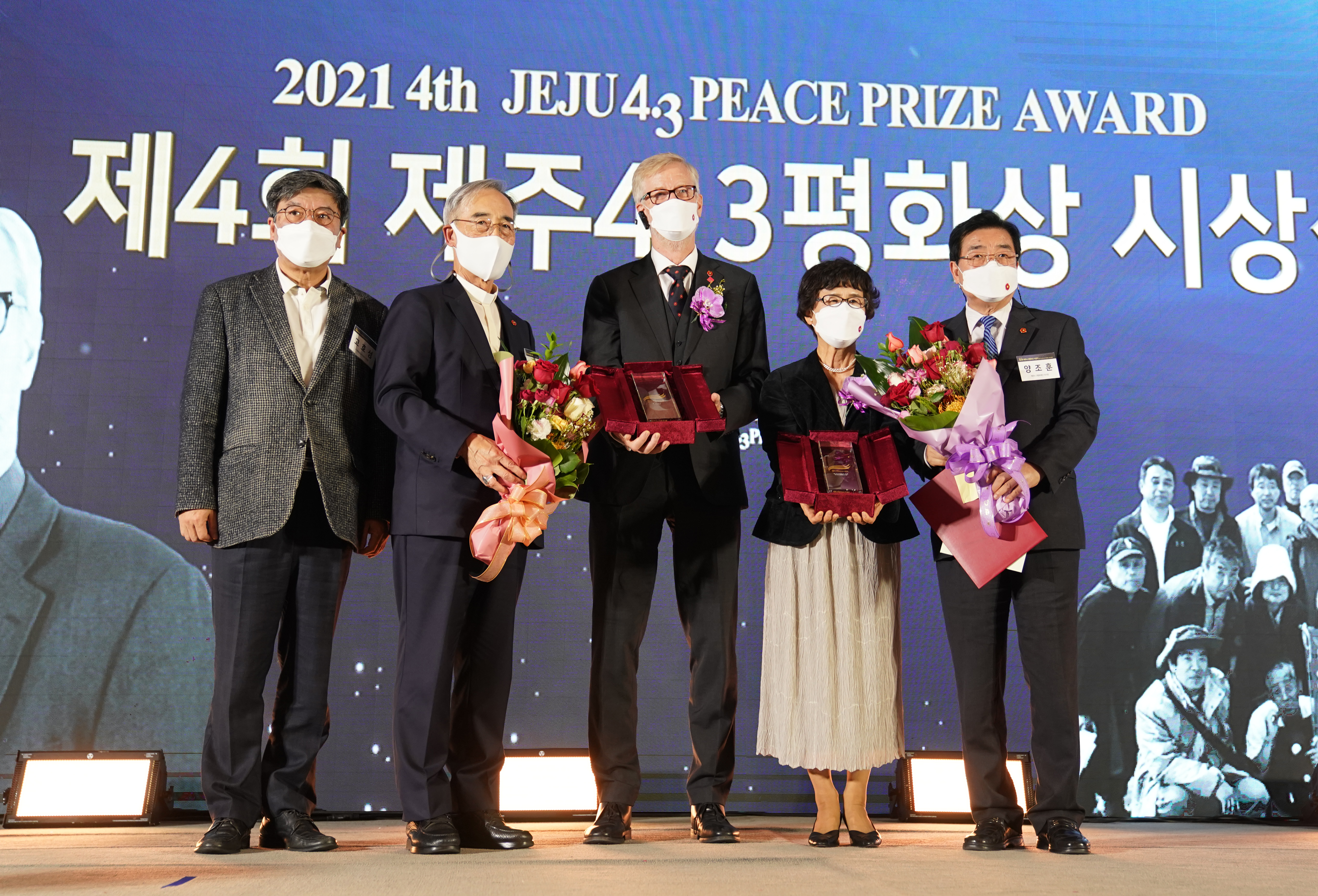
The award presenters and the awardees of the Jeju 4·3 Peace Prize and Special Prize pose for a commemorative group photo: (left to right) Ko Ho-sung, chairman of the Jeju 4·3 Peace Prize Working Committee, Catholic Bishop Kang U-il, chairman of the Jeju 4·3 Peace Prize Award Committee, Dan Smith, winner of the Jeju 4·3 Peace Prize, Akiko Nagata, representative winner of the Jeju 4·3 Special Prize, and Yang Jo Hoon, president of the Jeju 4·3 Peace Foundation.
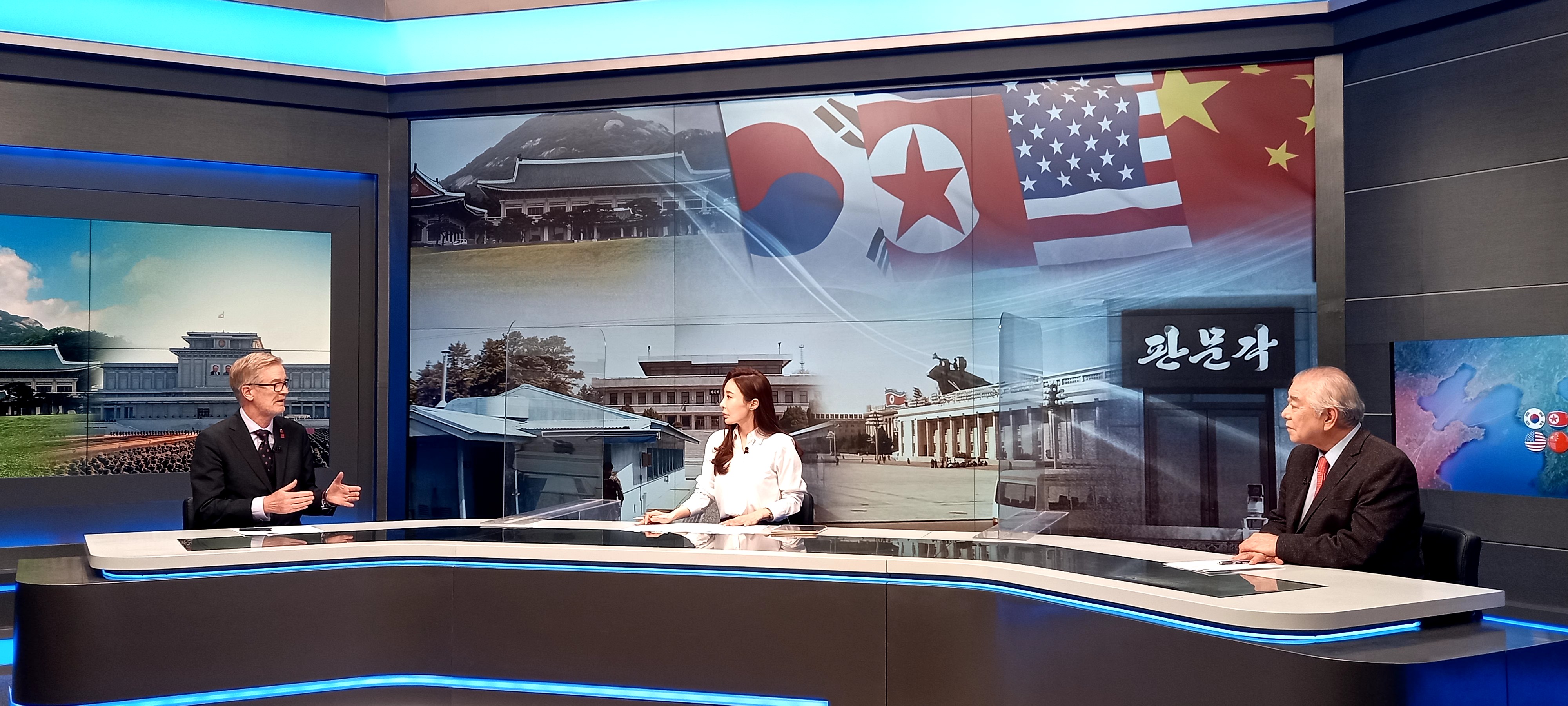
Arirang News broadcasts “Special Roundtable: Ending the Korean War,” featuring Stockholm Peace Institute Director Dan Smith (left) and Sejong Institute Chairman Moon Chung-in (right) with Jen Moon.
Meanwhile, Arirang News, the flagship news program of South Korea’s English-language television network, dispatched three reporters to Jeju to broadcast news on the ceremony live to the world for two and a half minutes. As the day’s top news, the program aired the visit of the awardees to the Jeju 4·3 Peace Park, as well as the highlights of the awards ceremony. The reporters explained that Jeju 4·3 is a historical event where some 30,000 Jeju residents were killed in a military crackdown due to their protest against the division of the Korean Peninsula. The news also reported that the SIPRI director was awarded the prize for his contribution to prospects of peace in the world, as shown in January 2019 when SIPRI organized a working-level meeting between the two Koreas and the United States.
On Dec. 1, the state-led broadcasting station invited Smith to its studio for “Special Roundtable: Ending the Korean War – Stockholm Peace Institute Director Dan Smith and Sejong Institute Chairman Moon Chung-in with Jen Moon” during its feature program, News Special. During the meeting, Smith met with Moon Chung-in, current chairman of the Sejong Institute and former Special Advisor of National Security and Foreign Affairs to President Moon Jae-in. The 40-minute discussion was broadcast worldwide at 9:00 p.m. on Dec. 3.
Calling for US accountability for Jeju 4·3, significance of borderless award highlighted
Early on the day of the awards ceremony, Smith and Nagata visited the Jeju 4·3 Peace Park to pay tribute to the Jeju 4·3 victims at the Memorial Altar. The memorial event was led by the president of the Jeju 4·3 Peace Foundation and the chairman of the Association of the Bereaved Families of the Jeju 4·3 Victims. The awardees of the Jeju 4·3 Peace Prize burned incense and paid silent tribute in memory of the souls of those who were killed under false accusations.
In the joint press conference, the media was briefed on their activities and accomplishments, as well as their thoughts about winning the prize and its significance. Smith stressed the acts of the US government concerning the Jeju 4·3 issues. Although it is unrealistic to expect the Biden administration to make a formal apology to the victims of Jeju 4·3, the recently disclosed historical documents clearly demonstrate that the US army military government in Korea appointed the officials and military leadership who were directly responsible for Jeju 4·3, which puts the accountability on the US government, he stated.
Nagata said it is significant that Jeju 4·3 Hallasan Mountain Society, a group of Japanese activists, was recognized with the prize. She said the achievement is impressive in the broader context of ROK-Japan relations, given the worsened political relationship between Korea and Japan.
Winning Speech
I can hardly express how honoured I am today and how grateful to receive the Jeju 4·3 Peace Prize for 2021. This is a moment I will always treasure.
When I was informed of this extraordinary honour, I read that the Jeju 4·3 Peace Foundation’s committee saw me as an activist, scholar, and leader of world-renowned institute as well as someone working for peace in the Korean peninsula.
Today – beyond just saying, “Thank you”– I thought perhaps I could talk about each of those four points: activism, scholarship, SIPRI and the Korean Peninsula.
Let me start with the context of Jeju.
The people of Jeju showed great steadfastness in the long campaign to have the truth of the massacre in 1948 uncovered and acknowledged. Perhaps the full facts are still not all known but we know enough. Whatever the pressures of the time, whatever the situation in Korea and in world politics, whatever the fears and insecurities, what happened was not acceptable.
Such acts can never be regarded as acceptable or civilized.
When and where they happen, there needs to be accountability.
When the truth is hidden, it has to be uncovered.
And if there are some who want to suppress the truth and put fictions in its place, it takes pressure and a public campaign to make it possible for the truth to emerge.
That, perhaps, tells you what my theme is today.
Facts matter.
After university, I wanted a job in which I thought I could do some good. That led me to a job in what at the time was a very small Campaign for Nuclear Disarmament. And doing that work, I came to see how much facts matter.
Without understanding problems, there is no motivation to address them and no means of identifying how to handle them. Without knowledge there is no understanding. Without facts, there is no knowledge. If we want to change the world for the better, we need to know it and understand it.
That was the reason I became a researcher, seeking to understand the nuclear weapons in order to help in the work of eventually eliminating them.
Over the years, my focus changed as the world changed. In the late 1980s and early 1990s, the East-West Cold War ended, disarmament treaties were signed and the number of nuclear warheads in the world got less.
By the mid-1990s, like many people, I had rather left nuclear weapons behind. It was armed conflict in the global South, the Middle East and the peripheries of Europe that now had my attention.
Sadly, as the years went by, the problem of nuclear weapons became bigger again. The pace of nuclear arms reductions slowed and India, Pakistan and North Korea all developed nuclear weapons.
But as the world changed in this and that direction, I continued to believe in the importance of facts, knowledge and understanding as a basis for peaceful progress.
So perhaps it is natural that I was drawn to SIPRI. When it was founded in 1966, its mission was to present sound research to the policy world, so as to improve the prospects for peace and disarmament. What I call SIPRI’s DNA has two strands: to do research that is as accurate as possible; and to improve the prospects for peace.
Both strands express values: on the one hand, respect for the truth, and on the other, respect for human life and dignity.
As SIPRI gained a reputation for accuracy of its data, it developed convening power.
Over the years, SIPRI has held numerous seminars and conferences. These days we have two flagship annual events: the Stockholm Forum on Peace and Development, convened jointly with the Swedish Ministry of Foreign Affairs each May; and the Stockholm Security Conference each November. These two events have gone online in the last two years, each with several thousand participants.
In addition, SIPRI convenes smaller and quieter meetings. Discussions are confidential and off the record. We do not invite public knowledge of them in advance or while they are under way. This discretion helps the participants have the confidence to talk freely, to test out ideas. Some participants are officials but not all – though these others are nonetheless close to the policy world and to different governments.
We do not talk about these meetings much and generally only in vague terms. But the discussions can be important, helping to identify problems and solutions, despite everything else that divides the participants and the parties they represent.
One series of such meetings has concerned the Korean Peninsula. We have convened several and, as opportunity arises when the Covid-19 pandemic is over, we will do so again. We know they made a modest contribution to inter-Korean détente in 2018. We hope there can be a similar contribution in the coming period.
I first became particularly interested in the affairs of the Korean Peninsula almost 30 years ago when I was honoured to meet Kim Dae-jung. It was some time before he became President. He talked then about the Sunshine Policy, long before he had the opportunity to implement it. When I joined SIPRI, this was the first time I was able to make a small contribution to the prospects for peace in this part of the world. It was an immediate priority.
Friends, I would like to talk a little about the bigger picture.
The world is facing a troubling array of security challenges. These include issues that are traditional concerns, like the risk of nuclear war, the international arms trade, disputes and conflicts, and geopolitical confrontation.
Additional issues came into focus for many observers in the 1990s, such as intrastate wars and armed violence in which no state actors are involved.
Other security challenges, such as cyber vulnerabilities, the impacts of climate change and the consequences of pandemics, are largely new in this century. Taken individually, these challenges are complex and difficult to respond to. Taken together, as they interact with other features of the social, economic and political landscape, they are even more worrisome.
A security policy that is fit for purpose in the current age encompasses many tasks. It must look after the security both of the state and of communities and people in their daily lives – state security and human security at the same time.
It has to address challenges from a wide variety of sources.
It must manage and reduce the risks that arise from interstate rivalries, and from deficiencies of governance and of leadership both in national governments and in international agencies.
It must also include responses to the pressures created by the environmental crisis of today and not least the challenge of climate change. This already generates insecurity, instability and conflict. The impact of climate change will affect our lives, our societies, our economic possibilities and our politics for at least five decades to come, even if greenhouse gas emissions are sharply reduced and global warming slows down.
In addition, security policy today has to handle pressures arising from globalization and growing global connectivity, from socio-economic inequalities, from changes in land use due to population growth and economic development.
These processes – the political, the natural, the social and the economic – interact with each other, with negative consequences for human security and for social and political stability.
In this dangerous world, you in the Korean Peninsula face further issues – confrontation, the lack of a peace settlement almost 70 years after the war ended, the strategic and geopolitical sensitivities of the region.
If the global environment were more secure, it would be easier to make progress towards sustainable peace in the Korean Peninsula. Yet progress towards a sustainable peace could contribute to better international relations.
Even a measure as straightforward as an End of War Declaration would help. It would be a relatively limited measure, a step beyond the Armistice but not yet a Peace Settlement with all that entails. In current circumstances, it is worth assessing as a realistic possibility and a potential breakthrough in world politics.
The security horizon today and looking ahead is complicated, in a way that was perhaps unimaginable back in the 1960s when SIPRI was founded. Yet our mission is still to assemble and analyse the facts, in order to generate ideas for how to arrive at a better world. And the mission remains valid.
It also remains true that carrying out that basic mission lets SIPRI convene both big public events and the smaller, quieter activities.
And it is another lasting truth that with knowledge and understanding comes the motivation to challenge and to seek change and progress. Our greatest hope lies in well informed public movements for environmental responsibility and peaceful change.
With that, I would like to thank the Jeju 4·3 Peace Foundation for this wonderful honour you have bestowed upon me. Thank you very much.
2021. 11. 30.
Dan Smith
1. The meaning of ‘Act in Japan’
Allow me to express my sincere appreciation for the ‘Jeju 4·3 Peace Special Prize Award’.
The fact that this is the first time a ‘group’has won this award makes me feel a sense of both delight and responsibility, and it gives me a lot to think about.
I first visited Jeju Island in 2008 to participate in the propitiation ritual to soothe the victims’spirits held on the 60th anniversary of the Jeju 4·3 Incident. I arrived at Jeju International Airport with 47 people including Yutaka Umisedo and Chidori Narayi. Unlike the others in our party, Umisedo and Narayi left the airport in a hurry. I later heard that they had participated in the propitiation ritual, having attended the celebration held at the alcohol factory site on the eve of the Jeju 4·3 Incident. I think it was this first step that they took in Jeju, as they headed to the propitiation ritual held at the alcohol factory, that determined the destiny of the ‘Jeju 4·3 Hallasan Society’.
If people take part in the propitiation ritual only once, the meaning behind the ritual will soon be forgotten. Out of the thought that we should participate in the ritual every year so as to learn from the ‘Jeju 4·3 Incident’, several people, led mainly by participants in the ritual, created the ‘Jeju 4·3 Hallasan Society’. We also wanted to make the association ‘a gathering that acts’since it is important to practice what one learns. If all one does is think and learn without putting that knowledge into action, they will reach a standstill and fail to make further progress. Bearing this in mind, we held 4 rounds of the ‘Okinawa Gathering Thinking about the Jeju 4·3 Incident’in Okinawa in 2008, 2009, 2011 and 2012.
“Destiny seems to reveal itself in our encounters with other people. Those on journeys headed in the same direction are destined to be connected.”(Remarks by poet Kim Si-jong)
We have the chance to meet Jeju musician Ahn Bok-ja once again in Okinawa, having already met her in Jeju in April. In 2009, Ms. Ahn Bok-ja sang ‘Arirang’on Arirang Hill on Aka Island, which later led to the 2010 ‘Aka Island Peace Festival’. We also had poet Kim Si-jong give a lecture at the ‘Okinawa Gathering’in 2011. His story of his ‘Jeju 4·3’experience was a decisive factor for us. While attending his lecture, the song ‘Arirang’and the scene from that April day filled our minds. For the first time, we truly got a sense of the Jeju 4·3 Incident. Poet Kim Si-jong also attended the ‘Propitiation Ritual for Korean Wartime Sexual Slaves’held on Aka Island in 2012, which then led us to host a propitiation ritual in Tsushima.
Although we said that we acted in Japan, we felt there was something lacking since ours was just a ‘thinking group’. We continuously endeavored to explore what else needed to be done outside of the work we had been doing up until that point. One day, around the end of 2013, poet Kim Si-jong abruptly said, “I want to organize a propitiation ritual on Tsushima Island.”I could not understand what he meant since I thought that a propitiation ritual was something held only by bereaved family members. Without thinking, I asked, “Who will be hosting it?”He replied, “You’re the expert in propitiation rituals, aren’t you?”This is the story behind our decision to host a propitiation ritual for the Jeju 4·3 Incident in Tsushima. At long last, we came to learn the meaning of ‘Act in Japan’.
2. Challenges for the ‘Jeju 4·3 Hallasan Society’
We can see the direction of the actions taken in Japan, starting from the propitiation ritual held at the alcohol factory site on Jeju Island in 2008 to the ‘1st Tsushima and Jeju Propitiation Ritual for the 4·3 Incident’s Victims’held in 2014. This was made possible thanks to the meeting held between Mr. Simai and Mr. Eto
The challenge of the ‘Jeju 4·3 Hallasan Society’is to not only continue but to expand the ‘Propitiation Ritual for the 4·3 Incident’s Victims’, which connects Tsushima and Jeju. To this end, the ritual must go beyond the frame of the ‘Jeju 4·3 Hallasan Society’and seek to connect people while transcending national boundaries. The ‘Tsushima and Jeju Propitiation Ritual’has been created and fostered by the ‘Jeju 4·3 Hallasan Society’. From now on, I think the challenge for the ‘Jeju 4·3 Hallasan Society’is to transcend itself and keep moving forward.
On the occasion of winning the ‘Jeju 4·3 Peace Special Prize Award’, in place of offering my words of appreciation, I would like to look back on what the ‘Jeju 4·3 Hallasan Society’has done so far and articulate the future direction and plans of the association.
2021. 11. 30.
Advisor Isamu Nagata (長田勇)
